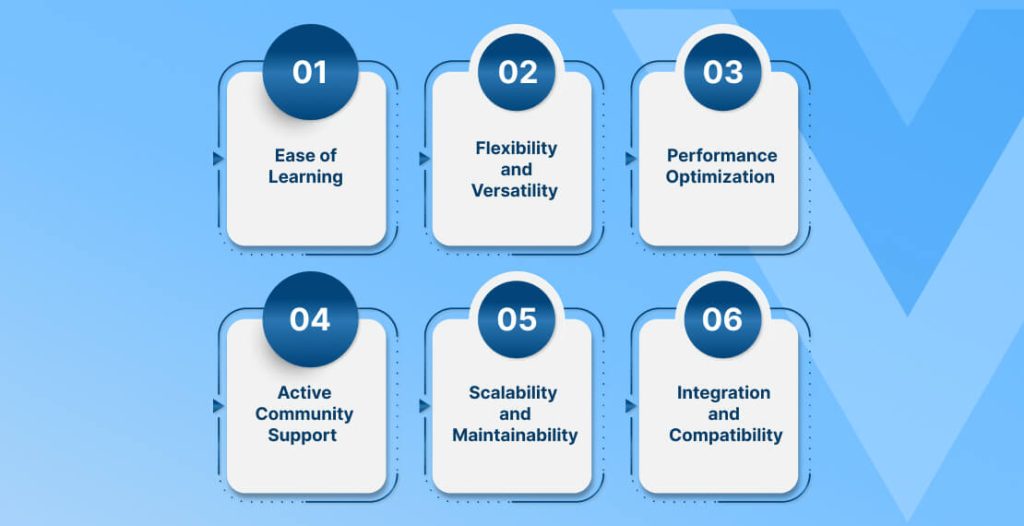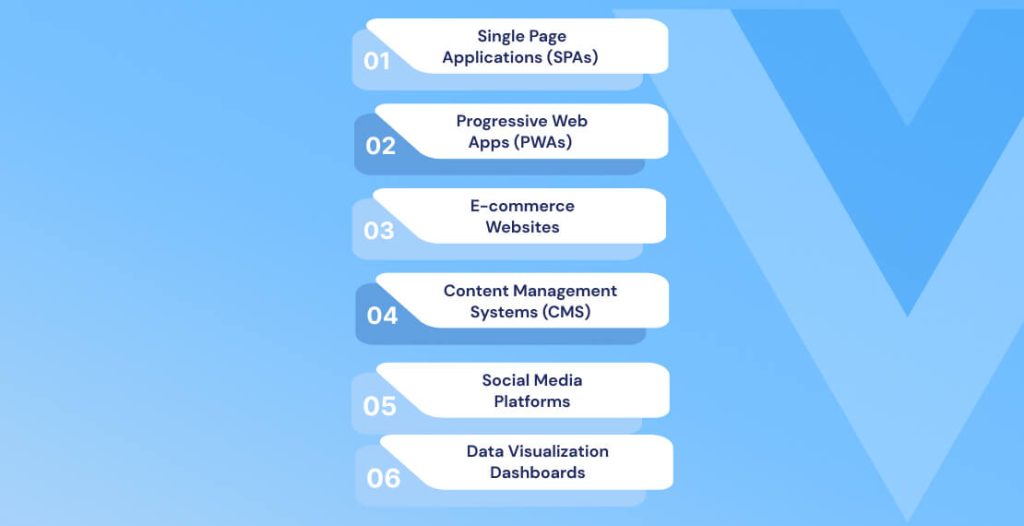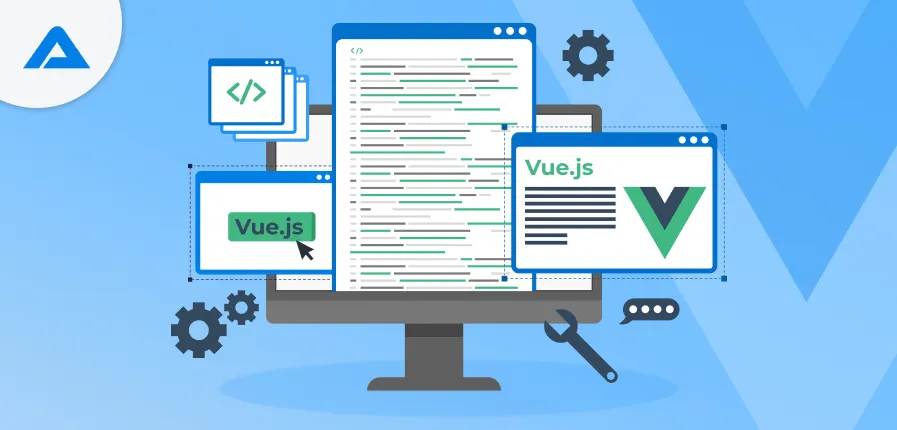In the rapidly evolving web development landscape, choosing the proper framework is crucial for modern businesses looking to stay ahead of the curve. Vue.js emerges as the perfect solution, offering a seamless blend of simplicity, versatility, and performance. With its intuitive syntax and modular architecture, Vue.js enables developers to quickly build elegant and responsive user interfaces.
Moreover, its progressive nature allows for seamless integration with existing projects, making it ideal for businesses seeking scalability and flexibility. Vue.js also boasts a thriving community and an extensive ecosystem of tools and libraries, providing companies with the support and resources they need to succeed. In this introduction, we’ll explore why Vue.js stands out as the perfect framework for modern businesses seeking to elevate their web development endeavors.
VueJS – A Quick Overview
VueJS, a popular JavaScript framework for creating interactive web interfaces and single-page applications, is gaining traction among developers due to its simplicity and versatility. Renowned for its lightweight design, efficient rendering, and extensive ecosystem, VueJS is an excellent choice for businesses aiming to streamline development processes and deliver exceptional user experiences.
Key Features of VueJS:
- Reactive Data Binding: Automatically updates the UI when data changes, ensuring seamless user experiences.
- Component-Based Architecture: Facilitates the creation of reusable and modular components, promoting code maintainability.
- Virtual DOM: Enhances performance by efficiently updating and rendering necessary components.
- Vue Router: Offers a robust routing system for easy navigation and management of application routes.
- Vuex: Enables centralized state management for Vue applications, enhancing efficiency.
- Template Syntax: Provides an intuitive and readable syntax for developers to write clean code effortlessly.
Statistics and Market Share of Vue.js
Vue.js stands as a frontrunner among frameworks for front-end solution, surpassing React and Angular with an impressive count of 200k Github Stars. According to the Stack Overflow Developer Survey 2023, Vue.js ranks 6th in developer popularity, capturing 16.38% of votes.
Data from SimilarTech reveals that Vue.js is utilized by 299,088 websites, of which 193,936 have unique domain names. A breakdown of usage by country is provided below. These statistics underscore Vue.js’s global popularity within the development community. From its origins as Evan’s experiment, Vue.js has experienced remarkable growth, garnering significant sponsorship, contributions, and advocacy. Its popularity is attributed to its adaptability, seamless integration into large projects, and ability to create robust applications without additional plugins or libraries.
Top 6 Reasons To Choose VueJS Framework

Certainly! Here’s a detailed explanation of the top 6 reasons why you should consider choosing the Vue.js framework:
Ease of Learning:
Vue.js offers a straightforward and user-friendly approach, making it accessible to developers of all levels.
The framework’s intuitive syntax and clear documentation make it easy to understand and implement. Even beginners can quickly grasp Vue.js concepts and start building applications without feeling overwhelmed.
Additionally, Vue.js provides a gentle learning curve, allowing developers to progress quickly and see tangible results early on. Its modular architecture and component-based structure further simplify the learning process, enabling developers to focus on creating great user experiences.
Flexibility and Versatility:
Vue.js allows developers to adapt and scale their projects according to their needs. With Vue.js, thanks to its versatile nature, you can build a wide range of applications, from simple websites to complex single-page applications. Its modular architecture and component-based structure allow easy customization and extension, making it suitable for various use cases.
Whether you’re a beginner or an experienced developer, Vue.js provides the tools and flexibility to bring your ideas to life and efficiently create modern, responsive web applications.
Performance Optimization:
Vue.js is designed to deliver fast and efficient performance, ensuring that your applications run smoothly and respond quickly to user interactions. Vue.js achieves performance optimization using a virtual DOM (Document Object Model). This allows Vue.js to update the DOM only when necessary, minimizing unnecessary re-renders and reducing the load on the browser.
Additionally, Vue.js employs efficient rendering techniques that optimize the rendering process, resulting in faster load times and improved overall performance for your applications.
Active Community Support:
Vue.js has a thriving community of developers, enthusiasts, and contributors who are always ready to offer help, share knowledge, and support.
This active community provides a wealth of resources, including documentation, tutorials, forums, and online communities, making it easy for developers to learn, troubleshoot, and stay updated on the latest trends and developments in Vue.js.
Whether you’re a beginner or an experienced developer, having access to such a supportive community ensures you can get assistance whenever needed, making your Vue.js journey enjoyable and rewarding. With the backing of an active community, you can confidently tackle any challenges and unlock the full potential of Vue.js for your projects.
Scalability and Maintainability:
Vue.js facilitates the creation of scalable applications that can grow alongside your business needs.
With Vue.js’s modular architecture and component-based structure, you can easily break down your application into smaller, reusable components. This promotes scalability by allowing you to add new features or expand existing ones without disrupting the entire codebase.
Moreover, Vue.js promotes maintainability by encouraging clean and organized code. Its clear and concise syntax makes it easier to understand and update code, reducing the risk of errors and speeding up development time. With Vue.js, you can build applications that are not only scalable but also easy to maintain and update in the long run, ensuring the longevity and success of your projects.
Integration and Compatibility:
Vue.js is designed to seamlessly integrate with existing projects and work well alongside other libraries and frameworks.
Whether starting a new project or adding Vue.js to an existing one, you’ll find that it integrates smoothly with your current technology stack. Vue.js is compatible with various tools and libraries, allowing you to leverage existing resources and infrastructure.
This compatibility ensures you can easily incorporate Vue.js into your workflow without significant disruptions. Whether using jQuery, React, or Angular, Vue.js provides flexibility and interoperability, making it a versatile option for developers seeking seamless integration and compatibility with their projects.
When to Use Vue.js and When to Disregard Vue.js?
Certainly! Here’s a user-friendly breakdown:
When to Use Vue.js:
- Ease of Learning: Choose Vue.js if you’re new to web development or prefer a framework with a straightforward learning curve. Its intuitive syntax and clear documentation make it accessible to beginners.
- Scalability: Opt for Vue.js if you anticipate your project’s complexity to grow over time. Its modular architecture and component-based structure make scaling your application as needed easy.
- Active Community: Select Vue.js if you value community support. With a vibrant community of developers and enthusiasts, you’ll have access to ample resources, tutorials, and forums to assist you throughout your development journey.
When to Disregard Vue.js:
- Project Complexity: Consider alternatives to Vue.js if your project requires advanced features or complex functionalities that other frameworks or libraries may better support.
- Legacy Systems: Look beyond Vue.js if you’re working with legacy systems or have strict compatibility requirements with existing technologies that may not align well with Vue.js.
- Team Expertise: Disregard Vue.js if your development team needs to gain experience or expertise with the framework. Opting for a technology stack familiar to your unit may result in faster development and fewer hurdles.
Ultimately, choosing or disregarding Vue.js depends on your project requirements, team expertise, and long-term goals. Consider these factors carefully to make the best choice for your web development endeavors.

Why use Vue.js over React
The reasons to opt for Vue over React are substantial. While React is a JavaScript library for web development, Vue stands out as a prominent progressive, open-source framework tailored to craft intricate user interfaces.
React necessitates a deep understanding of JavaScript, whereas Vue JS is particularly beginner-friendly. React operates by utilizing a virtual DOM (a replica of the Real DOM) to interact with HTML files, with each element represented as a JavaScript object. In contrast, Vue leverages a virtual DOM alongside two-way binding.
Vue outshines React in numerous aspects, including:
- Extensive Documentation: Vue boasts outstanding documentation and diverse best practice examples, swiftly illustrating all solutions Vue.js offers in concise formats.
- Flexibility in Problem-solving: Vue’s modular core library design allows for flexible problem-solving without constraints on integrating other tools.
- Enhanced Speed: Vue.js excels in speed compared to other frameworks due to its efficient implementation of the virtual DOM, leading to simplified and more productive development workflows for developers.
- Vue-CLI: TheVue-CLI (Command Line Interface) provides various unique tools, components, and project templates, enhancing developer productivity.
- Single File Components: Vue.js offers dynamic bundling, enabling the storage of HTML, JavaScript, and CSS in separate files, resulting in cleaner and more organized code structures.
Why use Vue.js over Angular
Vue represents a progressive lightweight framework paving the way for the next generation, while Angular is a TypeScript-based structural framework.
Vue stands out for its built-in app templates and greater flexibility, making it easier to use than Angular. Additionally, because Vue.js was developed by combining features from Angular and React, it seamlessly integrates Angular- or React-based mobility services into its platform. When comparing Vue.js versus Angular, Vue is renowned for its clean architecture and elegant designs. On the other hand, Angular’s extensive functionality makes it a preferred choice for many enterprises.
Vue excels over Angular in several aspects:
- Complexity and Syntax: Vue offers simplicity and ease of use, resulting in crisp, concise, and straightforward application code. Angular, in contrast, is more complex, often requiring long lines of code due to its rigid structural rules.
- Dynamic, High-Performance Apps: Vue is ideal for flexible projects, as its performance remains unaffected even with extensive changes. Thanks to its use of Virtual DOM, Vue applications maintain excellent performance levels.
- Single-Page Applications (SPAs): Vue is exceptionally well-suited for single-page applications because it facilitates quick modifications.
- Performance and Speed: With its compact size and lightweight nature, Vue offers outstanding performance and faster speeds. If simplicity and exceptional performance are your top priorities, Vue emerges as the front-end framework of choice.
Different Types of Web Apps that Can be Developed with Vue.js

Vue.js, a versatile framework, empowers the development of various types of web applications through its flexible and intuitive features. Here are some examples of web apps that can be developed with Vue.js:
Single Page Applications (SPAs):
Vue.js is well-suited for building SPAs, where all necessary code is retrieved with a single page load. SPAs provide a seamless user experience by dynamically updating content without requiring a full page refresh.
Progressive Web Apps (PWAs):
Vue.js can be used to create PWAs, web applications that provide a native app-like experience to users. PWAs are responsive, fast, and work offline, making them ideal for users across different devices and network conditions.
E-commerce Websites:
Vue.js is an excellent choice for ecommerce development solutions. Its reactive and component-based architecture enables developers to create dynamic and interactive product pages, shopping carts, and checkout processes, providing a smooth shopping experience for users.
Content Management Systems (CMS):
Vue.js can be used to build custom Content Management Systems (CMS) platforms for managing digital content. Its flexible and modular structure allows developers to create user-friendly interfaces for content creation, editing, and publishing tailored to the organization’s specific needs.
Social Media Platforms:
Vue.js is suitable for developing social media platforms, including user profiles, news feeds, messaging systems, and notifications. Its ability to handle real-time updates and interactions makes it ideal for building engaging and interactive social networking sites.
Data Visualization Dashboards:
Vue.js can create data visualization dashboards that display complex data sets clearly and interactively. Developers can use Vue.js alongside libraries like D3.js or Chart.js to build visually appealing dashboards for monitoring and analyzing data in various industries.
These are just a few examples of the different types of web applications that can be developed using Vue.js. With its flexibility, scalability, and rich ecosystem of libraries and tools, Vue.js is a robust framework for delivering high-quality web application development solutions across a wide range of industries and use cases.
How To Hire the Right Vue.js Developer?
Hiring the right Vue.js developer can be crucial for the success of your project. Here’s a user-friendly guide on how to do it:
- Define Your Needs: Start by clearly defining your project requirements and objectives. Determine what skills, experience, and expertise you need in a Vue.js developer to fulfill your project goals.
- Search for Candidates: Look for Vue.js developers through various channels such as job boards, freelancing platforms, and professional networks. You can also seek recommendations from colleagues or industry peers.
- Review Portfolios and Experience: Evaluate candidates’ portfolios and past projects to assess their proficiency in Vue.js development. Look for examples that demonstrate their skills, creativity, and problem-solving abilities.
- Assess Technical Skills: During the interview process, assess candidates’ technical skills in Vue.js, including their understanding of Vue.js concepts, such as components, directives, state management, and routing.
- Evaluate Communication Skills: Effective communication is essential for successful collaboration. Ensure that the developer can communicate clearly and effectively, both verbally and in writing.
- Consider Cultural Fit: Evaluate whether the candidate’s values, work ethic, and communication style align with your company culture. A good cultural fit can contribute to a positive working relationship and project outcomes.
- Ask for References: Request references from previous employers or clients to gain insights into the candidate’s performance, reliability, and professionalism.
- Discuss Availability and Commitment: Clarify the candidate’s availability, work schedule, and commitment to the project. Ensure they can dedicate time and effort to meet project deadlines and milestones.
- Negotiate Terms and Rates: Discuss compensation, payment terms, and other contractual agreements. Make sure both parties are clear on expectations, deliverables, and timelines.
- Trial Period or Test Project: Consider offering a trial period or a small test project to assess the candidate’s skills and suitability before making a final hiring decision.
Following these steps, you can hire a dedicated Vue.js developer who meets your project needs and contributes to its success.
Conclusion
In conclusion, Vue.js stands out as the ultimate framework for meeting the diverse needs of today’s businesses. Its intuitive syntax, extensive documentation, and adaptable nature make it the preferred choice for crafting modern web applications. Vue.js empowers enterprises to develop dynamic and responsive interfaces quickly, streamlining the development process and enhancing user engagement. With robust community support and a wealth of plugins and tools, Vue.js offers unparalleled flexibility and scalability to tackle projects of any size or complexity.
Whether you’re a startup looking to innovate or an established enterprise seeking to stay ahead, Vue.js provides the perfect blend of simplicity and sophistication. Embrace Vue.js to elevate your business, drive innovation, and deliver exceptional user experiences in today’s dynamic digital landscape.

Discover the Power of Vue.js Now! Start Building Dynamic and Efficient Frontend Applications Today

Pooja Upadhyay
Director Of People Operations & Client Relations


